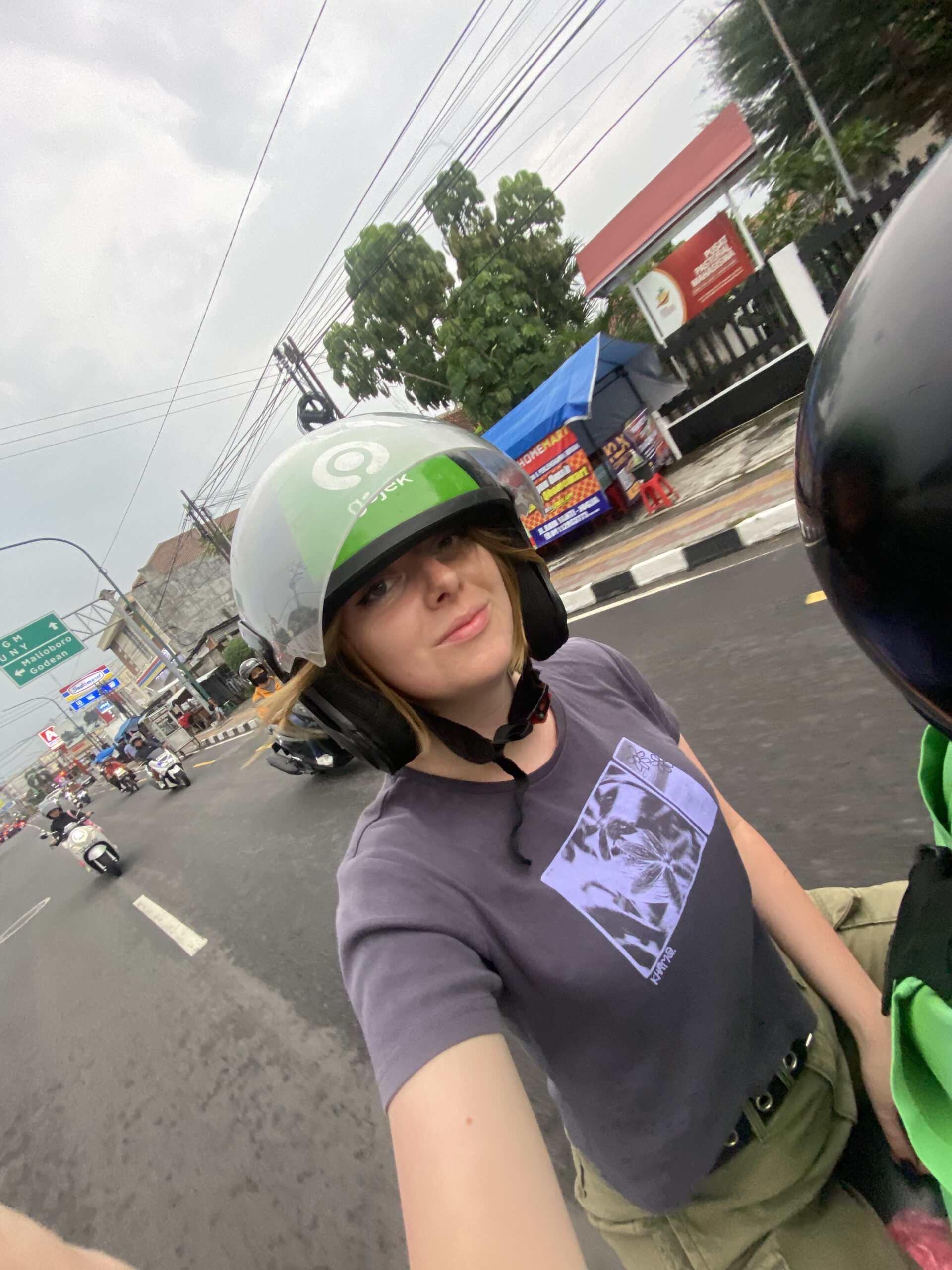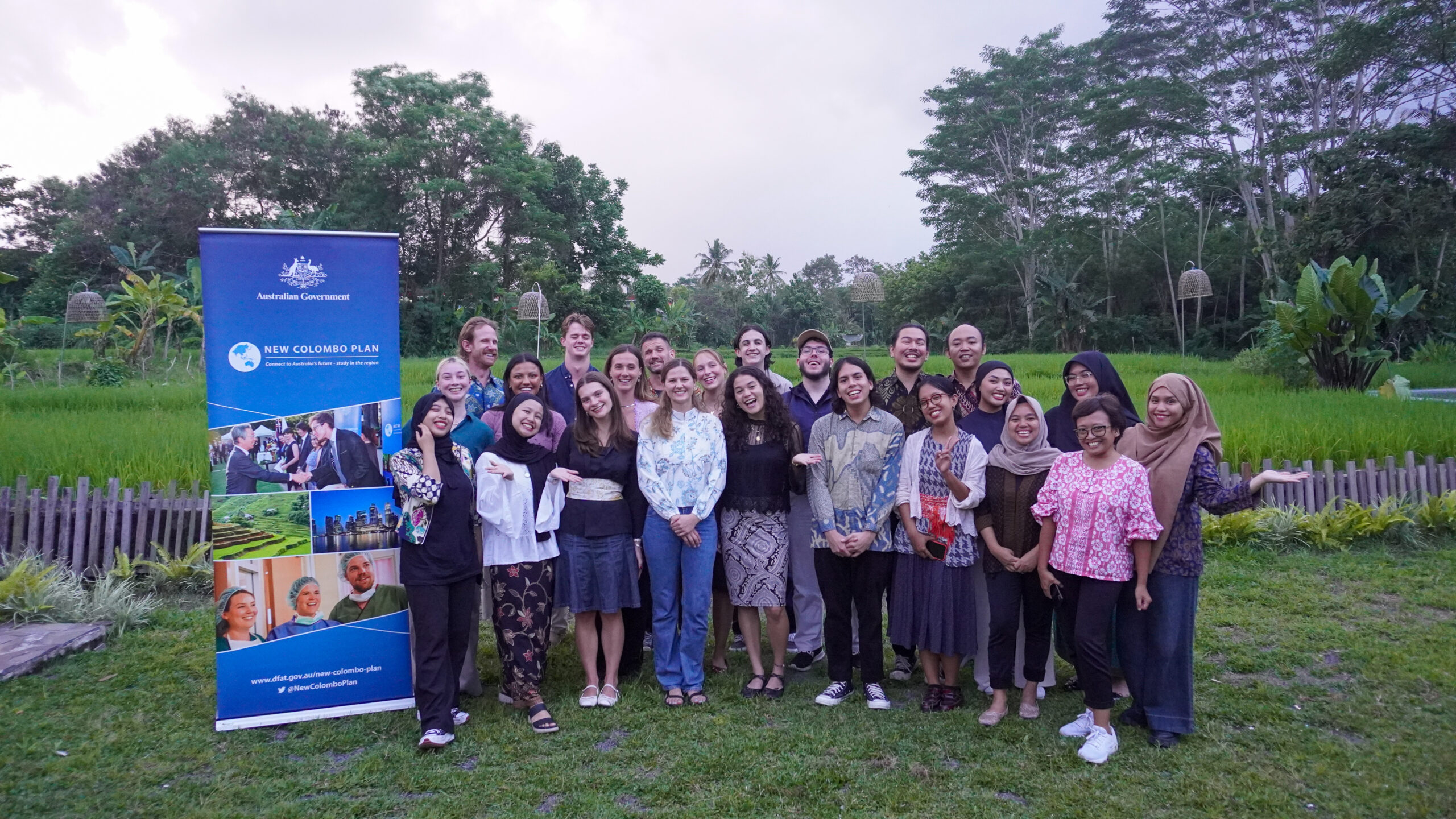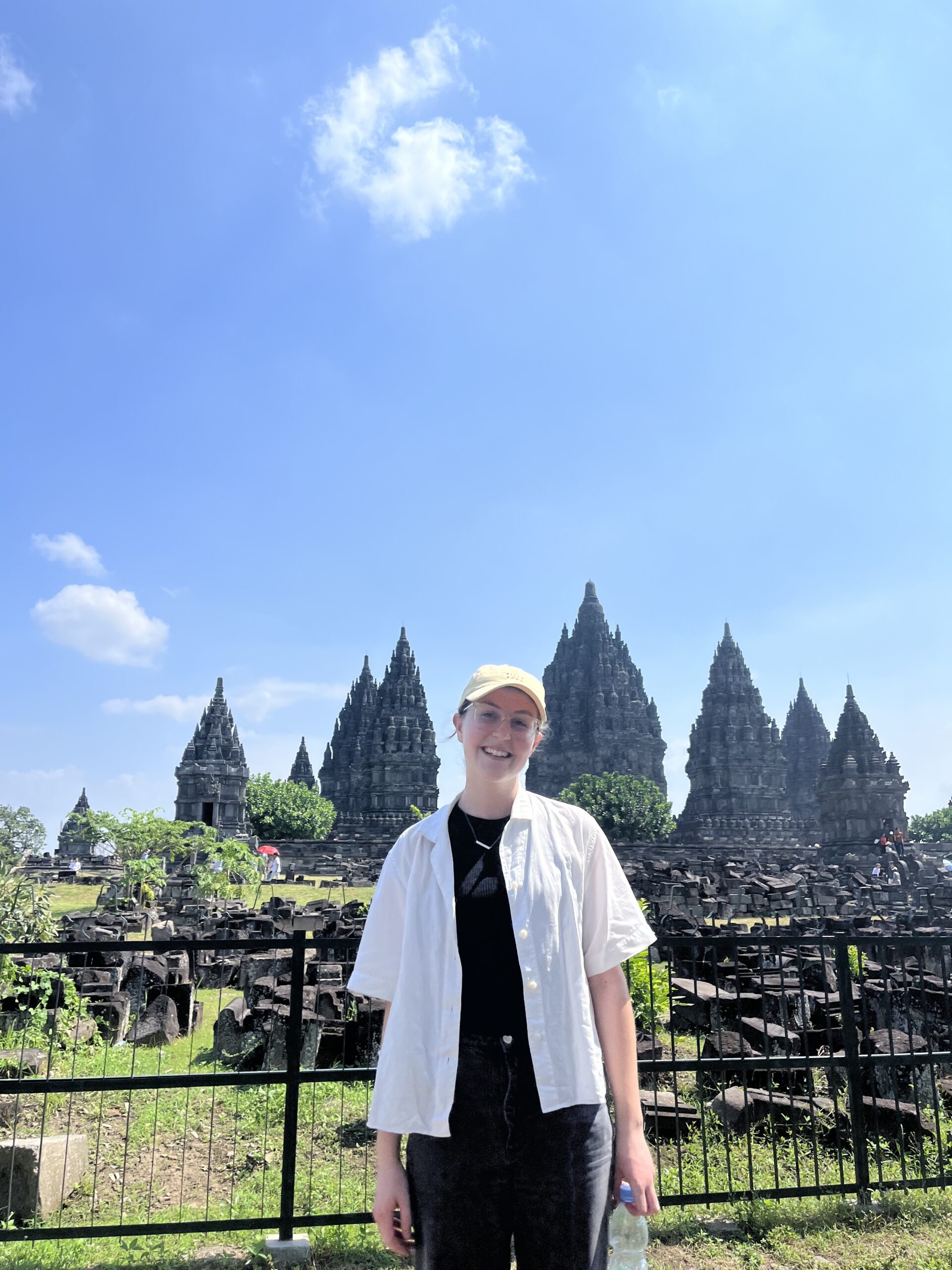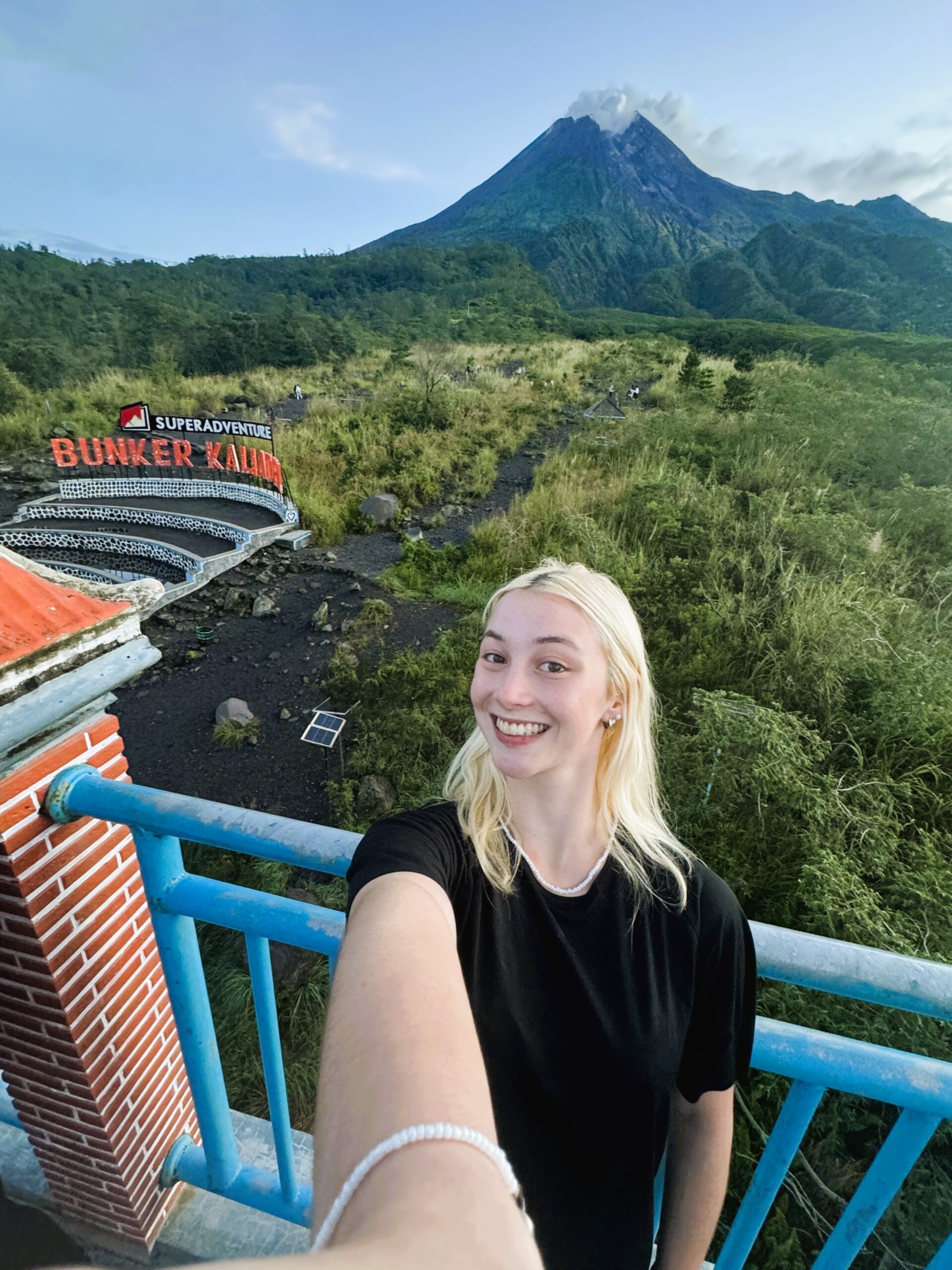Molly Kane is a New Colombo Plan Mobility Grant recipient from The Australian National University. Molly undertook the Flexible Language Immersion Program (FLIP) in 2024.
Q: Why did you decide to undertake the Acicis program?
I chose to participate in the Acicis FLIP program because I wanted to immerse myself in Indonesian university life, while also extending my language skills. I was about halfway through my degree, so this was the perfect way to switch things up and get out of my comfort zone. I found that my study in the law and cultural science faculties often complemented my language study through a deeper understanding of Indonesian legal, cultural and social context. Studying these topics in-country meant that I could further explore these themes outside the classroom. For me, this offered learning experiences that I couldn’t get at home.
Q: Did you receive a New Colombo Plan Mobility Grant? If so, how did this contribute to your experience in Indonesia?
Yes, I received a $7,000 NCP Mobility Grant. My exchange would not have been possible without this financial support! For me, this support enabled a much more relaxed experience including travel to some incredible locations in Sumatera and across Java which really added to my exchange experience.
Q: What classes/units are you currently enrolled in?
Indonesian C1 – Menulis: Advanced Indonesian writing course focusing on grammar and various text types
Indonesian C1 – Percakapan: Advanced Indonesian conversation course focusing on semi-formal conversation on various socio-cultural topics
Indonesian C1 – Menyimak: Advanced Indonesian listening course focusing on listening comprehension on various socio-cultural topics
Introduction to Indonesian Law – First year law course which gave a taster on 8 different areas of Indonesian law including criminal law, environmental law, and religious law.
Comparative Constitutional Law – Fourth year law course analysing constititional law, human rights protections and the separation of power in different countries around the world. Some background in constitutional law would be helpful before taking this course.
Executive-Legislative Relations – Fourth year law course considering the separation of executive and legislative branches of government in Indonesia. Some background in Indonesian law and constitutional law would be helpful before taking this course.
Sejarah dan Kebudayaan Jawa – Faculty of cultural science course taught in Indonesian (and occasionally some Javanese) about the cultural, religious and political history of Java. Advanced language skills would be helpful to take this course.
Q: Are you involved in any clubs/societies at the university?
I was not involved in any university clubs, but outside university I attended several events hosted by the Australia-Indonesia Youth Foundation. I also took language classes at Wisma Bahasa and attended some of their events.
Q: How will your proficiency in Indonesian Language gained through the Flexible Language Immersion Program influence your future career or study?
After the FLIP program I feel much more confident using Indonesian in both conversational and professional settings. One of the biggest challenges of my exchange experience was an in-class presentation on Javanese agricultural practices. Using my Indonesian with the added pressure of a university assessment and public speaking nerves was an achievement that made me feel much more confident in using Indonesian in my future career or study.
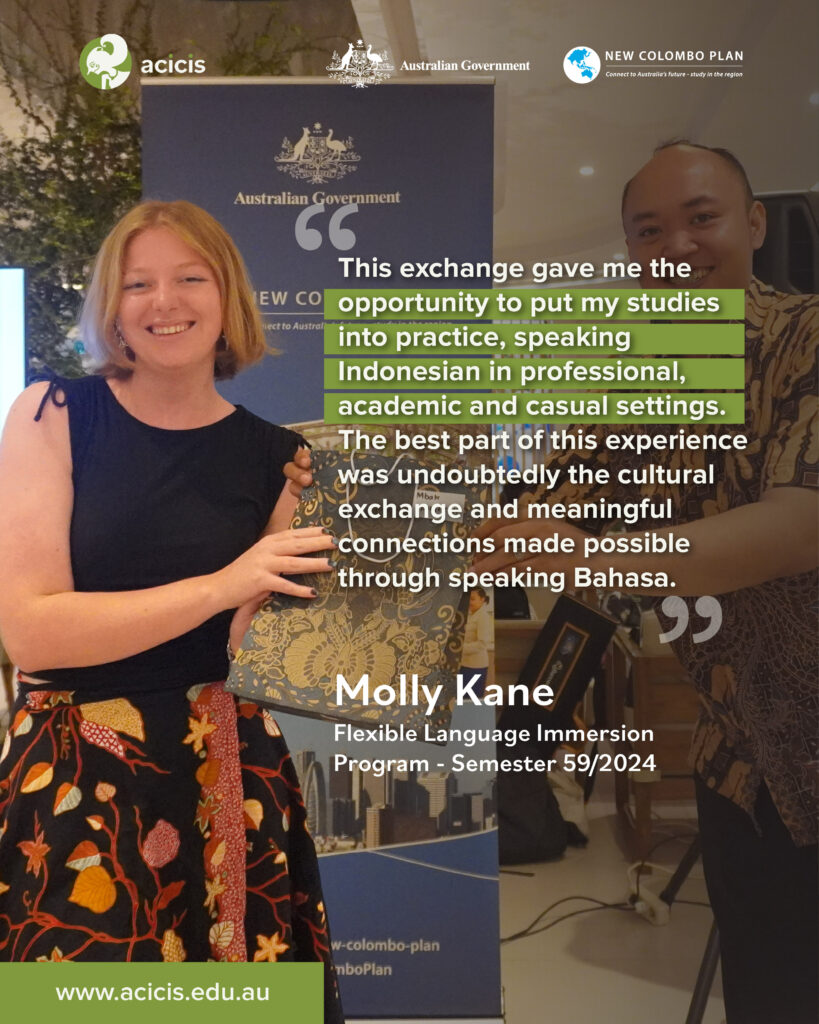
Q: How different is in-country Indonesian language learning to your previous experiences in an Australian classroom environment?
The experience was completely different. While the language class itself might be similar, the opportunity to put those lessons into practice several times per day accellerated my language learning far beyond what I could achieve in an Australian classroom. Additionally, in-country learning gave me a much better understanding of what everyday spoken-Indonesian sounds like, and introduced me to a whole new vocabulary of Indonesian slang.
Q: Did you undertake an internship or volunteering while in Indonesia?
Yes, I participated in an internship with Universitas Gadjah Mada’s Centre for Southeast Asian Social Studies (CESSAS). CESSAS is a university associated research organisation which hosts panel discussion seminars, issues academic publications, and occassionally offers university courses investigating social issues across ASEAN. I really enjoyed this internship and the insight it gave me into working in an Indonesian organisation. I was primarily responsible for research on one of their publication process, as well as some event logistics. I was also offered the opportunity to conduct research into a topic of my choice, and compile an article for publication on their website.
Q: What do you like to do in your spare time in Yogyakarta?
In my spare time I’ve really enjoyed exploring Yogyakarta’s historical and cultural sites, eating delicious food, as well as plenty of self-care spa days. I made it a goal to discover a couple of new cafes per week, as well as to try plenty of new food from across Indonesia.
Q: What challenges did you face during your program and how did you overcome it?
One challenge I faced during the program was the weather. Working out how to navigate the heat as well as the rain required a little bit of a lifestyle change from my routine in Australia. I soon worked out that avoiding the midday sun, having plenty of cool drinks, and always carrying a rain jacket were essential.
Q: Favourite Indonesian word/phrase? Why?
Nongkrong – an Indonesian slang term meaning to hang out with or be around friends in a casual way. It’s a tricky word to sum up in a definition, but I think it captures the open-hearted and relaxed way that people in Yogyakarta connect with each other and welcome new people.
Q: What’s the most interesting new discovery or story during your stay in Indonesia?
Before going to Indonesia I don’t think I was aware of how much food varies across the country. Yogya’s food is known for being really sweet, while food in other areas might be more salty or spicy. I really enjoyed trying different dishes from across Indonesia!
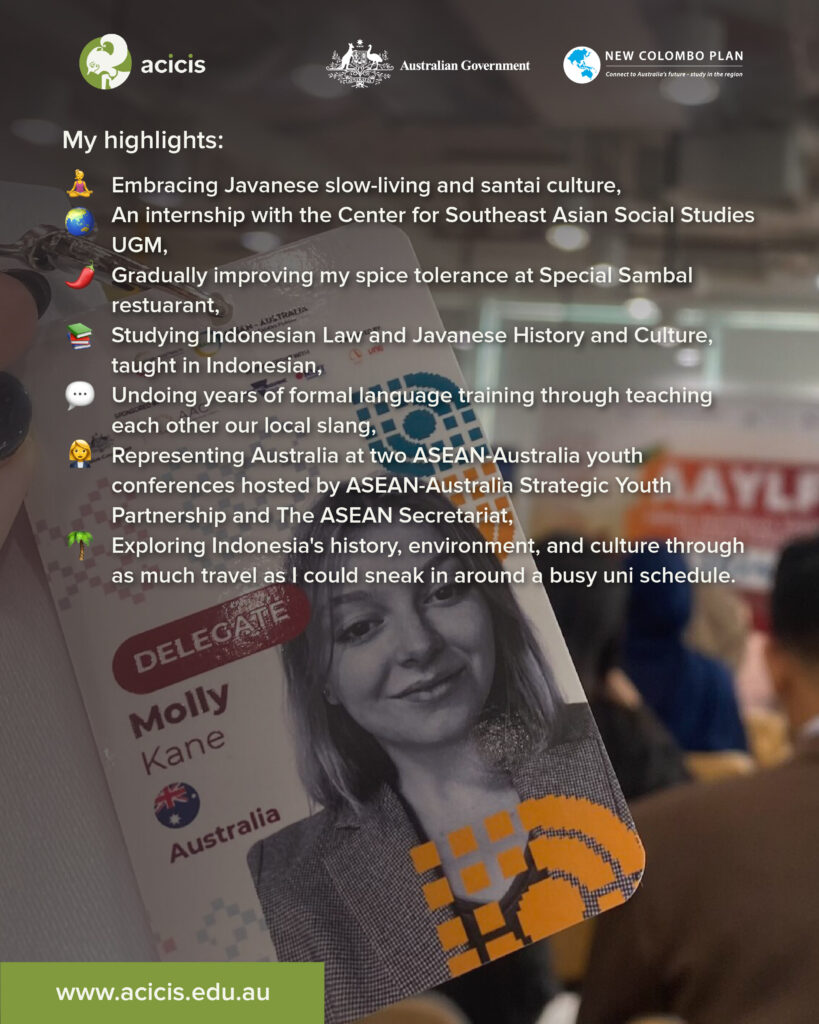
Q: Will you recommend Acicis to other students?
Yes of course! Exploring Indonesia through an Acicis program is a truly unique experience. There’s really nothing like it for full immersion into Indonesian life, culture and language. Assistance from Acicis made everything run smoothly for me, and offered a safety net of knowledge and help in navigating the logistical complexities of living overseas.
Q: Favorite Indonesian food / favorite place to eat?
Terong and jamur krispy at Special Sambal!
